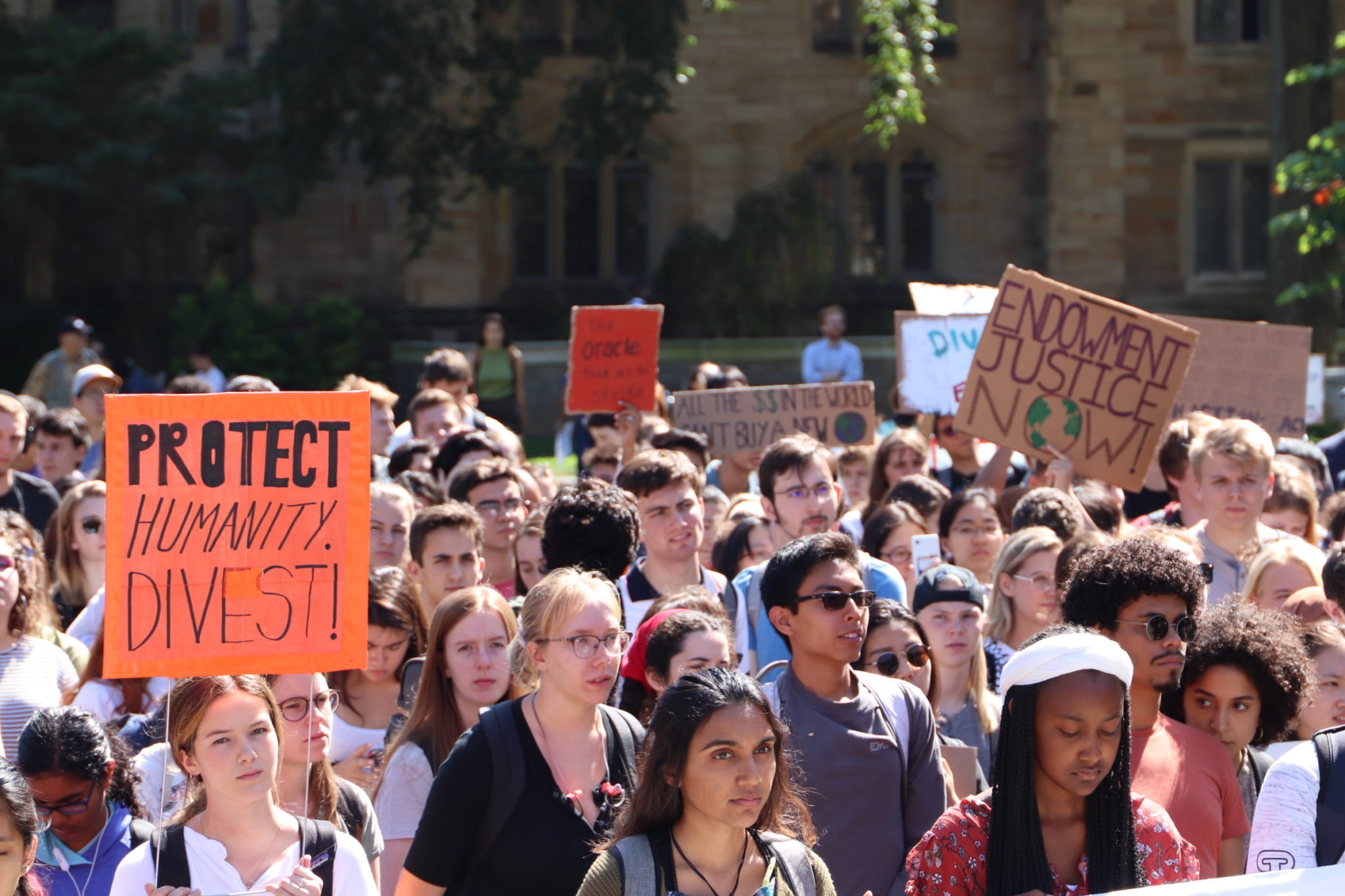EJC meets with CT Attorney General’s office to discuss legal complaint against University
The State will review the questions raised by the complaint, which alleges that the University’s fossil fuel investments violate state law.

Yale Daily News
The Yale Endowment Justice Coalition met with the Connecticut Attorney General’s office on Nov. 21 to discuss the EJC’s legal complaint against the University.
In February, the EJC filed a complaint against Yale for its continued investment in fossil fuels, alleging that these investments violate state law. The complaint, which has over 1,200 co-signatories, hinges on a provision of a 2009 Connecticut state law called the Uniform Prudent Management of Institutional Funds Act, which requires tax-exempt nonprofit entities, including universities, to invest with charitable interests in mind.
At the meeting, participants discussed the arguments brought forth in the complaint. According to an EJC press release, the conversation centered on the financial prudence of fossil fuel investments, the climate implications of the UPMIFA and the lack of transparency in the University’s decision-making processes. The complaint signatories also suggested legal pathways for enforcing the UPMIFA.
“This meeting provoked a startling feeling of uneasiness within me,” EJC organizer and meeting attendee Garrett Frye-Mason ’23 told the News. “It forced me to articulate in front of a legal entity that I struggle to understand what it means for me to graduate from an institution that touts a grand mission and justifies its non-profit status all the while existing within a system and legacy of staggering wealth hoarding, unethical investments, and austerity. What does it mean for me to attend what is functionally a hedge fund with a university attached?”
The EJC acted alongside divestment campaigns at Princeton University, Stanford University, Vanderbilt University and the Massachusetts Institute of Technology. Students from the schools, working collectively as the “Fossil Free 5,” filed complaints with their states’ attorney general in partnership with lawyers from the Climate Defense Project, an organization that aims to support climate activists with legal counsel. The UPMIFA has been passed in every state except Pennsylvania.
Representatives from Connecticut Attorney General William Tong’s office declined to comment on the meeting, writing in an email to the News that the office is “reviewing the questions raised in the [complaint].”
In addition to Frye-Mason, representing the complaint signatories were UPMIFA scholar and former SEC Commissioner Bevis Longstreth, Climate Defense Project attorneys Alex Marquardt and Ted Hamilton GRD ’22, global energy transition researcher Daniel Cohn, Ward 14 Alder Sarah Miller ’03, director and Climate Museum founder Miranda Massie GRD ’92, Yale Forward co-founder Scott Gigante GRD ’21, New Haven Rising leader Elias Estabrook ’16, architecture professor Keller Easterling and EJC organizers Molly Weiner ’25 and Josie Steuer Ingall ’24.
Members of Attorney General Tong’s executive staff and assistant attorney generals from the Charities Unit represented the Attorney General’s office. Tong himself did not appear at the meeting.
The UPMIFA states that Yale must invest with “prudence,” “loyalty” and with consideration for broader “charitable purposes.” The EJC claims in their press release and complaint that these fiduciary mandates are “undermined by the continued embrace of an industry misleading the public, masking financial and ecological peril, [and] attacking scholars (including Yale’s own).” The EJC holds that Yale is also acting in a manner contrary to its public mission statement: “Yale is committed to improving the world today and for future generations …”
When asked to comment on the complaint, University spokesperson Karen Peart directed the News toward Yale’s Fossil Fuel Investment Principles, a list of fossil fuel producers no longer eligible for University investment, new carbon reduction targets and former CIO David Swensen’s 2020 update on climate change.
“The property tax exemption Yale is entitled to as a nonprofit leaves New Haven residents on the hook for millions of dollars in lost revenue every year,” Steuer Ingall said in the press release. “The University shouldn’t be able to turn around and invest that money in an industry that’s rapidly making life on our planet unlivable.”
Steuer Ingall also underscored the importance of the EJC’s alliance with New Haven Rising, a progressive community organization “of residents committed to winning economic, racial, and social justice through collective action.”
New Haven Rising submitted an auxiliary report to the EJC’s legal complaint on March 11.
“We see ourselves as part of a larger movement against the financialization of academia,” Steuer Ingall wrote. “The Yale Model, which is a hugely influential, highly corporate paradigm for elite universities, was born here. We see Yale’s fossil fuel investments as a particularly egregious example of a larger pattern of bad faith behavior, prioritizing profit over mission.”
The Yale Model, developed by Swensen, is a framework for institutional investing that favors broad diversification of assets and allocates less capital to traditional U.S. equities and bonds and more to alternative investments like private equity, venture capital, hedge funds and real estate.
Yale’s investment strategy depends heavily on alternative investments, and, as of 2019, they made up about 60 percent of Yale’s portfolio. The EJC argues that “these non-traditional asset classes are linked to things like fossil fuels and Puerto Rican debt.”
The Yale Endowment Justice Coalition led a game-delaying divestment protest during the 2019 Yale-Harvard football game.
Correction, Dec. 16: A previous version of this article misattributed a quote to a representative of New Haven Rising. The quote was actually given by Josie Steuer Ingall ’24. The article has been updated to correct this.







